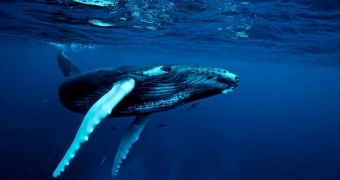Wildlife researchers say that, as surprising as this may sound, some humpback whales spend their winter in the icy waters of the Antarctica.
Most representatives of this species choose to migrate to the equator as soon as the summer months come to an end. However, a few don't seem to mind getting cold fins.
Writing in the journal PLOS ONE, scientists explain that they reached this conclusion after analyzing underwater recordings provided by the Antarctic acoustic observatory PALAOA.
Thus, underwater sounds recorded during winter in the eastern Weddell Sea clearly show that some humpback whales still inhabited those frozen waters at that time.
“I was totally surprised, because the textbook-opinion until that day was that humpback whales migrate to Antarctic waters only in the austral summer months. And even then, standing believes were that they would only be feeding on krill in the ice-free regions around 60 degrees south latitude.”
“However, our PALAOA observatory monitors an area 70 degrees south – so, much further south than hitherto known feeding grounds,” researcher Ilse Van Opzeeland explains, as cited by Science Daily.
The researchers suspect that the humpback whales that choose to spend their winter in the Antarctica are young females that are not pregnant.
They say that whales that travel to the equator burn quite a lot of energy to complete this journey.
However, since their calves can only survive in warm waters, they are left with no choice except head for African waters as soon as the Antarctica starts to get chillier.
By contrast, young whales that are not pregnant lack strong incentive to embark on this long and tiring trip. Hence the fact that they choose to spend the winter in the Antarctica.
“It appears energetically advantageous, from viewpoint of the young whale cows, to remain in Antarctic waters during winter,” Ilse Van Opzeeland says.
“Furthermore, the coastal region of the eastern Weddell Sea likely provides krill concentrations substantial enough for the animals to find sufficient food, even in the colder season, to acquire sufficient fat-reserves for reproduction and the long trip in the following year,” she adds.

 14 DAY TRIAL //
14 DAY TRIAL //